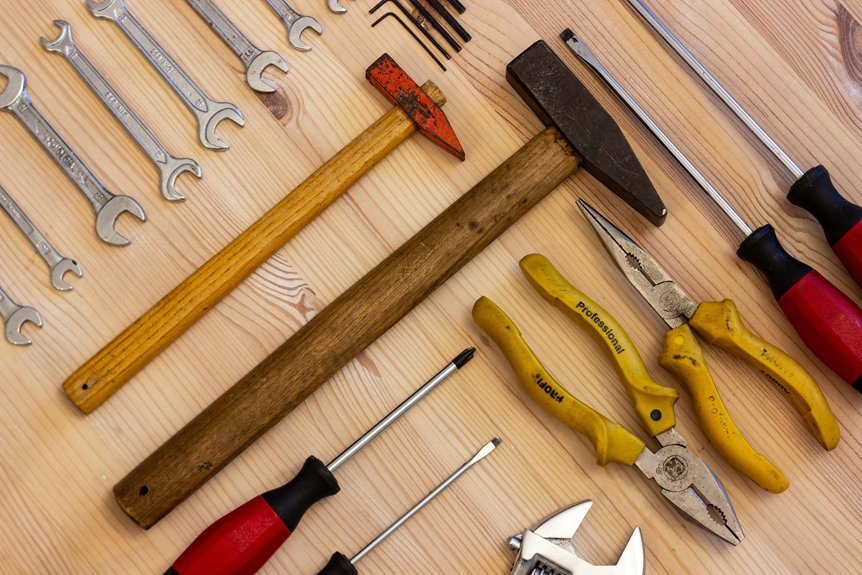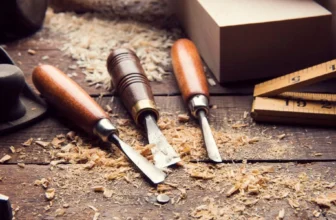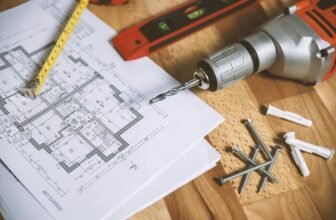
If you're just starting out in woodworking, it's crucial to equip yourself with the right tools. A well-rounded starter kit can make all the difference in your projects. You'll need essential hand tools, reliable power tools, and proper safety gear. But what specific items should you prioritize? Understanding these components can set you up for success and help you avoid common pitfalls. Let's explore what should really be in your toolkit.
Essential Hand Tools for Beginners
When you're starting out in woodworking, having the right hand tools can make all the difference. You'll want a solid set of essentials to kick off your journey.
First, grab a good quality hand saw; it's perfect for making precise cuts. A chisel set is crucial for shaping and detailing your projects, while a reliable hammer will help you assemble them.
Don't forget a combination square for measuring and marking, and a tape measure for accuracy. A block plane is invaluable for smoothing surfaces, and a coping saw allows for intricate cuts.
Finally, invest in a sturdy workbench and clamps to secure your work. With these tools in hand, you're well on your way to creating beautiful wood projects!
Must-Have Power Tools
Power tools can significantly enhance your woodworking experience, making tasks quicker and more efficient.
To kick off your toolkit, consider investing in a reliable cordless drill. It's versatile for drilling holes and driving screws in various materials.
Next, a jigsaw allows you to make intricate cuts, perfect for shaping wood. A circular saw is essential for straight cuts on larger pieces, while a router helps you create decorative edges and grooves.
For sanding, a random orbital sander saves you time and effort, ensuring a smooth finish.
Lastly, a compact table saw can be a game-changer for precision cuts.
With these power tools, you'll tackle projects confidently and elevate your woodworking skills.
Safety Equipment and Accessories
Although woodworking can be an enjoyable and rewarding hobby, safety should always be a top priority. To protect yourself, invest in essential safety equipment.
Start with safety glasses to shield your eyes from flying debris and dust. Hearing protection, like earplugs or earmuffs, is crucial when using power tools, as loud noises can damage your hearing.
Don't overlook a dust mask or respirator to keep harmful particles out of your lungs. Heavy-duty gloves are important to protect your hands from cuts and splinters.
Lastly, consider a first-aid kit for emergencies. By equipping yourself with these safety accessories, you'll create a safer workspace, allowing you to enjoy your woodworking projects with peace of mind.
Maintenance Tools for Longevity
To keep your woodworking tools in top shape, having the right maintenance tools is essential.
Start with a good set of sharpening stones or a honing guide to keep your blades razor-sharp. A quality brush helps remove sawdust and debris, ensuring your tools function smoothly.
Don't overlook a reliable oil or rust inhibitor to protect metal surfaces from corrosion. A soft cloth for polishing will also keep your tools looking great.
Invest in a digital caliper for precise measurements, which can help maintain your equipment's accuracy. Regularly checking and tightening screws on your tools will extend their life.
Conclusion
As you dive into woodworking, having the right tools makes all the difference. Your starter kit should include essential hand tools, must-have power tools, and safety gear to keep you protected. Don't forget maintenance tools to ensure your equipment lasts. With these essentials in hand, you're well on your way to creating beautiful projects. Enjoy the journey, embrace your creativity, and remember that practice makes perfect—so get started and have fun crafting!




